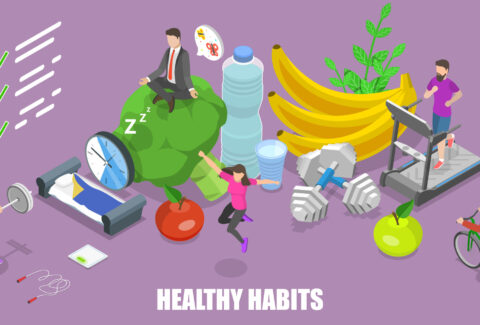Why Healthy Habits Today Can Protect You from Diseases Tomorrow
The choices you make today shape the health you’ll have tomorrow. Small, consistent habits may not seem like much at first, but over time, they can be the difference between a life of vitality and one plagued by chronic illness.
From what you eat to how much you move, sleep, and manage stress, every daily decision plays a role in preventing diseases such as heart disease, diabetes, and even some cancers. Many of these strategies align with those found in 5 Small Changes to Build Healthy Habits That Last a Lifetime, proving that even the smallest efforts add up.
Let’s explore how building healthy habits today acts as a safeguard for your future well-being.
The Power of Prevention: Why It’s Easier to Stay Healthy Than to Recover
Many of the most common diseases—such as obesity, type 2 diabetes, and cardiovascular disease—develop over years due to lifestyle choices. Preventing them is far easier than reversing them later in life.
The Long-Term Benefits of Healthy Habits:
- Reduces inflammation – A balanced diet and exercise help lower chronic inflammation, a root cause of many diseases.
- Maintains a healthy weight – Obesity is a leading risk factor for diabetes and heart disease.
- Strengthens immunity – A strong immune system fights infections more efficiently.
- Improves longevity – Studies show that a healthy lifestyle can add years to your life.
Invest in your health today so you don’t have to pay for illness tomorrow.
If you’re wondering where to start, From Fast Food to Fresh: Easy Swaps to Eat Healthier Without Giving Up Flavor offers practical ways to improve your diet without feeling restricted.
Nutrition: The Foundation of Long-Term Health
What you eat fuels your body at the cellular level. A diet rich in whole foods provides essential nutrients that protect against disease, while processed foods loaded with sugar and unhealthy fats do the opposite.
How Your Diet Affects Disease Prevention:
- Lowers risk of diabetes – Balanced meals with fiber and protein help regulate blood sugar.
- Supports heart health – Healthy fats and whole grains reduce cholesterol and high blood pressure.
- Prevents cognitive decline – Antioxidant-rich foods like berries and leafy greens protect brain health.
Your body is built from what you eat—choose wisely.
For hydration tips that complement a nutritious diet, check out Why Staying Hydrated is a Game-Changer for Your Health to keep your body functioning at its best.
Exercise: A Natural Defense Against Disease
Regular physical activity doesn’t just build muscle—it builds resilience against disease. The benefits extend far beyond fitness, influencing everything from mental health to metabolism.
The Role of Exercise in Disease Prevention:
- Improves insulin sensitivity – Reduces the risk of type 2 diabetes.
- Boosts cardiovascular health – Strengthens the heart and lowers blood pressure.
- Enhances mood and stress resilience – Lowers cortisol levels and increases endorphins.
Movement is medicine—make it part of your daily routine.
If you’re new to exercise or need motivation, Why Exercise is the Ultimate Power-Up for Teens breaks down how movement benefits both the body and the mind.
Sleep: The Silent Healer
Quality sleep is often overlooked, yet it is one of the most critical components of long-term health. Poor sleep is linked to an increased risk of obesity, heart disease, and mental health disorders.
How Sleep Protects Your Health:
- Regulates hormones – Balances hunger hormones to prevent weight gain.
- Boosts immune function – Helps your body fight off infections.
- Improves cognitive function – Essential for memory, focus, and emotional well-being.
Sleep is not a luxury—it’s a necessity for a healthy life.
For a deeper dive into optimizing sleep, read The Sleep Cheat Code: How Better Rest Boosts Your Energy, Mood, and Health to develop better sleep habits today.
Stress Management: Keeping Your Body in Balance
Chronic stress weakens the immune system, increases inflammation, and contributes to numerous health conditions, including heart disease and digestive disorders.
How Managing Stress Prevents Disease:
- Lowers blood pressure – Reduces strain on the heart and arteries.
- Protects mental health – Prevents anxiety, depression, and burnout.
- Supports gut health – A healthy gut microbiome is crucial for immunity and digestion.
Your body hears everything your mind says—keep it positive and balanced.
For techniques on reducing stress effectively, explore Why Stress Sucks for Your Health and How to Manage It for practical tips that fit into any lifestyle.
Hydration: The Overlooked Health Protector
Many people underestimate the role of hydration in disease prevention. Water supports nearly every function in the body, from detoxification to circulation.
How Hydration Shields You from Disease:
- Flushes out toxins – Keeps kidneys and liver functioning properly.
- Prevents kidney stones and UTIs – Proper hydration supports urinary health.
- Improves joint and muscle function – Reduces the risk of cramps and injuries.
Drink more water—your future self will thank you.
If staying hydrated feels like a challenge, Why Staying Hydrated is a Game-Changer for Your Health provides easy strategies to meet your daily water needs.
The Bottom Line: Small Habits, Big Impact
You don’t need a drastic lifestyle overhaul to protect your future health. The key is consistency. Eating nutritious foods, staying active, prioritizing sleep, and managing stress can all reduce your risk of chronic disease.
By making small, sustainable changes today, you can safeguard your well-being for years to come. Many of these strategies are covered in 5 Small Changes to Build Healthy Habits That Last a Lifetime, making it easier than ever to start your journey to lifelong health.
Which healthy habit will you focus on today? Share your commitment with us on social media, and let’s build a healthier future together!






